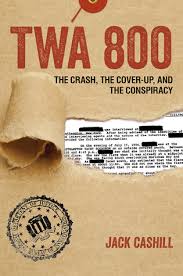Why We Know Clarence Thomas Was Framed
![]()

Order Jack Cashill's latest book, TWA 800: The Crash, the Cover-Up, and the Conspiracy
![]()

About Silenced: Flight 800
and the Subversion
of Justice (DVD) -
-Buy the Silenced DVD-
![]()
© Jack Cashill
September 19, 2018 - WND.com
Christine Blasey Ford, who has accused Supreme Court Justice nominee Brett Kavanaugh of drunkenly groping her when both were in high school, has attracted a share of believers because her charges are so specific, if not to time and place, at least to the type of sexual misconduct.
Twenty-seven years ago Anita Hill, in accusing Clarence Thomas, also scored points for specificity. Thomas pointed out a pubic hair on top of a coke can. He talked in detail about a porn star famously named “Long Dong Silver.” He talked about his own sexual prowess. And he kept pressing her for dates, which she continued to decline.
What undid Hill, at least for those paying attention, were her problems with time and place. Unfortunately, those who did not pay enough attention include virtually the Republicans on the Senate Judiciary Committee and virtually all pundits on the right.
In July 1991, the woman who would orchestrate the Thomas lynching watched the news of his nomination at her California home.
“He’s the one,” Susan Hoerchner screamed to her husband. He was the one, Hoerchner recalled, whom her Yale Law school pal Anita Hill had fingered as a hound dog back in 1981 when both she and Hill worked in Washington.
Ten years later, Hoerchner was serving as a low-level judge in California, but Hill had moved on to the law school of Oral Roberts University in her native Oklahoma, a humble teaching post that Thomas had helped her secure.
Although no one would take credit for what happened that July of 1991, it seems likely that the politically savvy Hoerchner put the harassment story in play.
Before the month was out, well-wired media people like Tim Phelps of Newsday and Nina Totenberg of National Public Radio knew about the Hill allegations.
So too did abortion activists like Kate Michelman, the national director of the National Abortion Rights Action League. Abortion, after all, was the cause that inspired the Borking of Thomas and Kavanugh as well.
Hoerchner and other activists had been scheming to force Hill into the open for weeks. Hill, like Ford, continued to vacillate. She did not want her name in play, but Senate staffers continued to lean on her, as did her friend Hoerchner, as did the media.
Finally on September 23 Hill faxed a letter to the Senate Judiciary Committee claiming that Thomas had pressured her to date him and talked graphically about sex in her presence.
Thomas learned of the allegations two days later when FBI agents came to his home to follow up on Hill’s accusations. “When informed by the FBI agent of the nature of the allegations and the person making them,” Thomas would testify, “I was shocked, surprised, hurt, and enormously saddened.”
Thomas, of course, survived the assassination, but the question remains as to whether Hill was telling the truth, at least about Clarence Thomas.
Only one individual testified that Hill had complained about Thomas at the time of the alleged harassment in 1981. That was Hoerchner. In her deposition for the Judiciary Committee, Hoerchner told of how she and Hill spoke regularly throughout 1981 when both lived in Washington.
It was during this time that Hill confided in her that Thomas had been harassing her. In September 1981, Hoerchner left for California, and the conversations stopped. Here is how this played out in the deposition.
Q. And, in an attempt to try to pin down the date a little bit more specifically as to your first phone conversation about the sexual harassment issue in 1981, the year you mentioned, you said the first time you moved out of Washington was September of 1981; is that correct?
A. Right.
Q. Okay. Were you living in Washington at the time you two had this phone conversation?
A. Yes.
Q. When she told you?
A. Yes.
Q. So it was prior to September of 1981?
A. Oh, I see what you're saying.
Hoerchner and her attorney, future DHS honcho Janet Napolitano, promptly asked for a recess. Hoerchner had just subverted the timeline on which the case against Thomas rested.
"I began working with Clarence Thomas in the early fall of 1981,” Hill told the Judiciary Committee. “Early on, our working relationship was positive.”
By Hill’s account, Thomas did not begin to pester her for roughly three months. At the earliest that would have been December 1981, three months after Hoerchner left for California, three months after she and Hoerchner stopped talking on any kind of regular basis.
Hoerchner, in fact, described her communication with Hill after September 1981 as "sporadic." In her deposition, she described only one post-Washington contact, that of meeting with Hill at a professional seminar in 1984.
After conferring with Napolitano, Hoerchner had a convenient change of memory. Now it was time for the friendly Democratic counsel to ask, “When you had the initial phone conversation with Anita Hill and she spoke for the first time about sexual harassment, do you recall where you were living -- what city?” Answered Hoerchner, “I don't know for sure.”
The author who first reported the Hoerchner angle was none other than professional chameleon David Brock. Once the scourge of the left, Brock morphed into progressive smear artist extraordinaire as impresario of Media Matters for America.
Although he has tried to distance himself from his reportorial past, his work on Hoerchner’s testimony holds up. He explained why in a New York Times op-ed attacking Anthony Lewis’s 1993 review of his book, The Real Anita Hill.
The problem with Hoerchner, wrote Brock, went much deeper than “a harmless lapse of memory.” Hoerchner, Brock explained, had been entirely clear on the regularity of her calls with Hill: when they took place, where they took place, and how they ended after Hoerchner moved.
This all changed when a Senate lawyer pointed out the inconsistency in timing. When Hoerchner came back from a hasty recess, she “was suddenly unable to recall anything about the time or place of the call. But she was now adamant that Ms. Hill had named Judge Thomas as the perpetrator, a point on which she had previously been unsure.”
The inference that Brock made here and in his book was that if Hill had been harassed as she charged, the harasser was not Thomas. The giddy momentum behind the accusation took Hill to a place she did not really want to go.
This happens, and it may very well be happening again right now.

